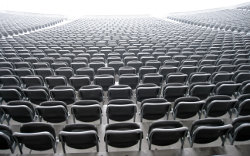
One of the people I highly respect is Father Robert Barron. He produces videos on Catholicism that are faithful, informative and interesting. Fr. Barron has short, topical videos on his YouTube channel. He has also produced longer presentations for TV broadcast. In a few months, Fr. Barron will release the eagerly awaited Catholicism Project.
I have learned a lot from Fr. Barron and have always found his teaching to be rock-solid. I was shocked then, when I heard his comments on Is Hell Crowded or Empty?
The Church teaches that hell is real. It has never taught that any person in particular has ended-up there, even Judas (likely, but not certain). For that matter, the Church teaches that only a relatively few Saints in particular are known to be in heaven. Where everyone else, who ever lived, landed is not definitively taught, not in particular or (debatable) in general. We are free to have differing opinions on the general proportion of heaven vs. hell. Mine is opposite that of Fr. Barron.
This subject is visited quite often in Holy Scripture as well as in Sacred Tradition. While heaven is offered to all, many have rejected it by rejecting God. We do not know the relative proportion of those in hell vs. heaven, but I believe that most faithful Catholics would say hell is well populated.
It seems to me this is similar to the question of the Assumption of the Blessed Virgin Mary before 1950. In that year, Pope Pius XII infallibly defined this doctrine in Munificentissimus Deus. At that time, questions were being raised for this long-held Catholic belief backed by Sacred Tradition (but not Holy Scripture). The case for hell being far from empty seems even stronger, although not (yet) infallibly declared.
In his piece, Father Barron begins by mentioning Rob Bell, an Evangelical mega-church pastor who wrote Love Wins, a very non-evangelical view that presents a Universalist, “everyone is saved” position. Father compares this with Origen of Alexandria (around 200AD) who took a similar position (that was condemned by the Church).
Moving to modern times, Fr. Barron notes that 20th century Protestant theologian Karl Barth held views similar to Bell and Origen on this topic. Father did not agree with Barth, but agreed with his contemporary – Catholic theologian Hans Urs von Balthasar who believed there is a reasonable hope that all people will be saved.
With all due respect to Balthasar and Fr. Barron, this is where I disagree. Certainly I share the hope that all people will accept the salvation paid for by Our Lord on Calvary. That they will be saved, almost all, the majority, a significant portion… I am sadly doubtful. It is obvious in today’s world how many people reject God. God, through His Son, has mercifully given us a chance for eternal life – not a guarantee (or near gaurantee).
Bell and Origen suggest heresy. Balthasar’s view misses that, but not by much.
If these few academics were correct, then heaven is ours regardless of what we do. We would be free to reject God’s will, ignore His Church, believe whatever we wish, live in sin or perhaps even worship Satan. While these things would affect our life here, we would still have a “reasonable hope of salvation.” That friends, is hogwash!
Part of the reason this alarms me is because I sense that this is exactly what many people believe. IF there is a God and IF heaven exists, since He is merciful I will be assured of my place there. In the mean time, there is no reason to order my life in any way other than that which pleases me the most. Only I am important. God’s will is irrevelant.
Father Barron himself points out how this view differs from Saint Augustine of Hippo and Saint Thomas Acquinas. Both of these Doctors of the Catholic Church believed that most people will be damned. Father also acknowledges the “dark view” of hell Jesus often spoke of, for example:
Enter through the narrow gate; for the gate is wide and the road broad that leads to destruction, and those who enter through it are many. How narrow the gate and constricted the road that leads to life. And those who find it are few.
Clear enough to me! It was also clear enough to many Church Fathers revered for trustworthy teaching of the faith and who now pray for us in Heaven:
The greater part of men choose to be damned rather than to love Almighty God.
Saint Alphonsus Maria Liguori (Doctor of the Church)
On the threshing floor, few are the grains carried into the barns, but high are the piles of chaff burned with fire.
Pope Saint Gregory the Great (Doctor of the Church)
It is certain that few are saved.
Saint Augustine (Doctor of the Church)
Out of one hundred thousand sinners who continue in sin until death, scarcely one will be saved.
Saint Jerome (Doctor of the Church)
What I am about to tell you is very terrible, yet I will not conceal it from you. Out of this thickly populated city with its thousands of inhabitants, not one hundred people will be saved. I even doubt whether there will be as many as that!
St. John Chrysostom (Doctor of the Church)
I do not speak rashly, but as I feel and think. I do not think that many priests are saved, but that those who perish are far more numerous.
also St. John Chrysostom (Doctor of the Church)
Christ’s flock is called “little” (Luke 12:32) in comparison with the greater number of the reprobates.
Saint Bede the Venerable (Doctor of the Church)
The greater part of men will set no value on the blood of Christ, and will go on offending Him.
Saint Isidore of Seville (Doctor of the Church)
(also my confirmation Saint)How few the elect are may be understood from the multitude being cast out.
Saint Hilary of Pointiers (Doctor of the Church)
The majority of men shall not see God, excepting those who live justly, purified by righteousness and by every other virtue.
Saint Justin Martyr
There are a select few who are saved.
Saint Thomas Aquinas (Doctor of the Church)
The number of the elect is so small – so small – that, were we to know how small it is, we would faint away with grief: one here and there, scattered up and down the world!
Saint Louis Marie de Montfort
The Catechism also addresses this in some detail in paragraphs 1021 through 1060. For example:
We cannot be united with God unless we freely choose to love him. But we cannot love God if we sin gravely against him, against our neighbor or against ourselves: “He who does not love remains in death. Anyone who hates his brother is a murderer, and you know that no murderer has eternal life abiding in him.” Our Lord warns us that we shall be separated from him if we fail to meet the serious needs of the poor and the little ones who are his brethren. To die in mortal sin without repenting and accepting God’s merciful love means remaining separated from him for ever by our own free choice. This state of definitive self-exclusion from communion with God and the blessed is called “hell.”
CCC 1033
Michael Voris at RealCatholicTV did an excellent piece on this topic entitled How Many Will be Saved?, from which the above Saint quotes were drawn. John Salza at Scripture Catholic also has a very good page on hell.
My opinion: hell is quite full, filling fast, but with plenty of space to accommodate everyone. Satan has a chair for each of us and hopes to fill it. Many seats will be claimed.
UPDATES:
- Bryan Cross gives an excellent analysis of this topic at Called to Communion
- Piers Paul Read addresses shortcomings of Balthasar and his selective read of Lumen Gentium
- Mark Shea provides a good analysis of what the Church teaches definitively
- Michael Voris addresses the topic in this video .



























There are also the visions that saints have had… St. John Bosco, St. Faustina, and the three children of Fatima who saw souls falling like snowflakes. They all saw a well-populated hell. Even approved apparitions aren’t required to be believed, so I lean more on the Bible and the teaching of Church Fathers like you’ve quoted, but the visions definitely add another reason to think that many go to hell. Eternal agony is the most difficult part of the Faith for me to understand and believe, but I definitely trust God’s judgment over mine.
This is a topic that has interested me from time to time throughout my life, which gets longer by the day! : )
Yes, the Church does teach that heaven, hell, and purgatory are real. At the age of ten I was confirmed, and as part of the preparation for that sacrament, I was taught specifically that the good people, those who die in God’s favor (the state of grace) will be rewarded (heaven) while the bad people, those who die alienated from God (mortal sin) will be punished (hell). But, throughout what I consider an excellent education and upbringing in the Faith, we never got into discussions about how many souls would populate heaven and hell. It was enough to know that both possibilities exist. And I would add that I think it’s still enough to know that without pondering the numbers.
It is recently that I heard of the Rob Bell book about hell that you cited above. The author suggests that because God is good and all loving that he sends no one to hell. I haven’t read the book and doubt that I will, but my understanding is that it is popular these days.
Referring, again, to what I was taught in my youth, I learned that God doesn’t “send” anyone to hell; rather, the sinner chooses hell or, in effect, sends himself or herself to hell. That makes sense to me when considering that God has given us a free will, and he allows us to exercise our will. We can choose to conform our will to God’s will or not. I even recall hearing a teacher or two say that if God did allow grave sinners into heaven, the sinners would hate it. Who knows? That’s speculation.
“…a reasonable hope that all people will be saved”
All this means is that we are permitted to hope that very many, if not all, will be saved. It doesn’t mean that will actually happen. But, to hope such a thing is to hope that sinner’s will repent and be converted. If we knew that most people would be damned it would be a temptation to despair. If we knew all or most would be saved we could become presumptuous. If we knew it would be half and half we might become rivals of one another, rejoicing that someone else’s apparent (?) damnation would increase the possibility of one’s own salvation. Not a very Christian outlook, is it?
Two references that I highly recommend for anyone to read on the topic of hell are:
The Population of Hell by Avery Cardinal Dulles:
http://www.firstthings.com/article/2008/08/the-population-of-hell-23.
Heaven, Hell, and Purgatory by Pope John Paul II:
http://www.ewtn.com/library/papaldoc/jp2heavn.htm.
Thanks Ruth Ann!
We have a reasonable hope that all will be saved. How could we hope otherwise? Hearing just that, it is easy for people (who hear what they want) to not understand the statement correctly. While this is our hope, free will choices make all the difference if that hope will be realized or not. It does matter if God’s merciful forgiveness is truly accepted.
I agree completely that God sends no one to hell. He wants us with Him for eternity but that can not happen on our terms. Of course, we don’t know how many people are in hell. However, people should know not only that hell exists — but that it is a certainty, not a remote possibility, unless they accept God’s will on His terms.
What about the scripture that says the dragon took one third of the stars out of the sky (angels), and hurled them at the Earth? If Angels are “saved” at a rate of 2/3, and people are saved at a rate of 1/40, was does that mean? Were we people created with inferior soul DNA, causing us to choose death FAR more frequently? Is there some mistake in our creation formula, which the Angels got better?
I would always be careful about interpreting any piece of scripture in isolation, particularly Revelation (this is 12:4).
One thing I do know is that God did not create us with inferior “soul DNA”. If an individual were created with a mental handicap, then God would not judge his actions as sinful to the degree that handicap interfered with free will.
FWIW – my guess is that the percentage, unknown that it is to us, of people who choose hell probably varies from one period of time to another.
Thank You. I was troubled after watching Fr. Barron’s video today and this post provided me the answer’s and resources to restore peace and clarity with my lifelong Catholic faith and teachings.
Just a thought…If purgatory is as horrible and painfull as its believed to be then everybody deserving of hell could end up there…Someone evil like hitler could spend 5 million years there and be purged of his sin…So if a protestant not believing in purgatory were to say all may be saved I couldn’t agree…Because then where would Gods justice be ? But on the other hand if purgtaory was in the picture and souls can spend a unlimited amount of time there and can experience an unlimited amount of pain then I can see how all could mabey be saved…Added to the fact God wills all to be saved…So if God wills it who’s to say it can’t happen ? Not saying I think it will but purgatory I think makes it possible…I remember reading Augistine arguing that the verse that says God wills all to be saved was meant to mean only the ellect…He argued if the verse were directed at all men then surely everyone would be saved…Cause if God wills it then it will happen…Anyhow that’s my thoughts…Godbless….
Josh, that is an interesting thought. The main problem in this remains mortal sin and its consequences. CCC 1861 on mortal sin says (in part) “it causes exclusion from Christ’s kingdom and the eternal death of hell, for our freedom has the power to make choices for ever, with no turning back.” Purgatory’s role is to address outstanding venial sins and the temporal punishment for forgiven sins.
We are all called to become saints, but through God’s great love for us, have the free will to choose. Our will is “free” of God’s. His will is that we all choose to be saved but the choice is ours.
One thing that is important is to consider what constitutes “rejecting God” and “mortal sin”. Is something a mortal sin if I don’t think what I am doing is wrong? Am I rejecting God if I don’t even know if God exists?
No and no! In any particular instance, it is for God alone to judge. That said, we know that for a sin to be mortal it (1) must be a grave matter, (2) committed with full knowledge and (3) deliberate consent. All sin rejects God but mortal sin breaks communion with Him. If we love Him, we keep His commandments (John 14:15).
God can perfectly read our hearts. Unlike our interactions with each other or even ourselves in interior thoughts, He can not be fooled. Deliberately “not knowing” (when in fact we really do or have strong suspicions) won’t fly. Nor will our own rationalizations for sin (every sin has rationalization).
Every man who is ignorant of the gospel of Christ and of his Church but seeks the truth and does the will of God in accordance with his understanding of it can be saved (CCC 1260). Not formally knowing of the existence of God is not rejecting him, but it is certainly a more difficult path to salvation. This is why Jesus gave us the Great Commission (Matthew 28:19).
Thank you for your reply, George. As of today I am officially a Catechumen, and I appreciate resources like yours that have helped me out of the Mormon faith and into the Truth.
This topic has always been a difficult one for me. I do not doubt that mortal sins have been committed in the span of human history, but I find it hard to believe that they are as common as some people believe. Who can truly act against the one they know is the giver of life? Perhaps my view of human beings is too optimistic. Perhaps I have been fortunate enough to grow up around a disproportionate amount of decent people.